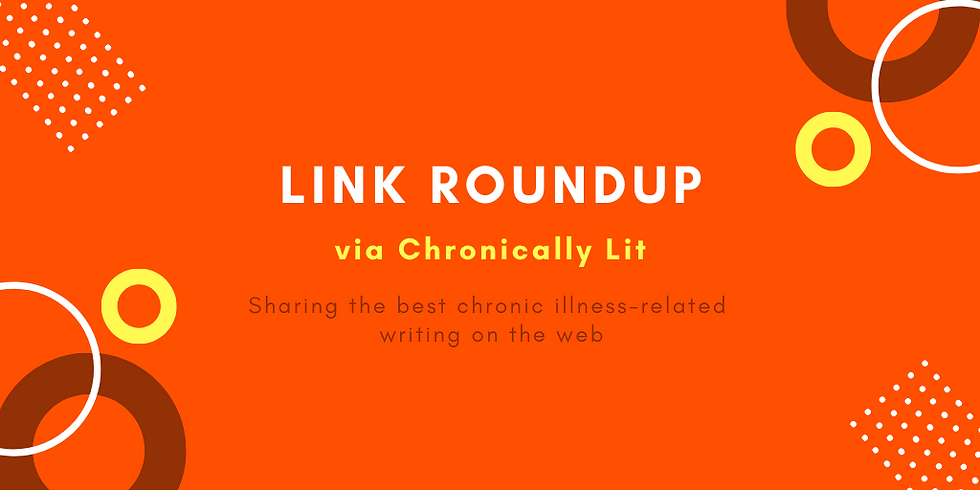Link Roundup: February 15th, 2019
- editors
- Feb 15, 2019
- 4 min read
Updated: Dec 20, 2022

Hi all! It’s Jay. I do a link roundup (almost) every Friday. If you encounter a link you think I might want to share, please tweet it at me or Chronically Lit.
Since my diagnosis, I’ve talked to so many women about the ways illness can complicate relationships. I’ve heard stories of breakups, of cheating, of detachment and callousness. It’s not just anecdotal — research shows that being a woman with a serious illness increases your chances of “partner abandonment,” and that this desertion subsequently affects quality of life.
Caroline Reilly writes about the difficulties of dating with chronic illness for The Washington Post.
*
Ashley Fetters’ recent Atlantic essay about the “problem” with weighted blankets as last year’s hot holiday trend felt like a reminder. A reminder that I’ll never be part of the “meditation-app-using, Instagram-shopping masses” Fetters’ piece bemoans, regardless of whether I actually use Instagram or meditation apps. Why? Because to Fetters, I’m “special.” Actually, I’m not just “special.” I have “special needs.” And I am, by her essay’s reckoning, under attack. Because nondisabled people are buying weighted blankets, I am having my “special needs” culturally appropriated.
As an autistic person, did I ask for this defense? No. But I sure got it.
Interesting… The Atlantic ran an article that was somewhat critical about the recent popularity of weighted blankets, suggesting that it’s potential problematic the general public is buying so many of them since initially weighted blankets were created for people with autism and anxiety. Sara Luterman responded in Slate, arguing that weighted blankets can’t be appropriated, and the more popular they are, the better. I’ve never tried a weighted blanket myself, but would like to someday. Based on the way I’ve felt the few times I’ve slept under heavy quilts, I imagine it would be comforting.
*
I asked my husband if I have his permission to write about him and his illness in prose.
He said, just make sure you give me a really big penis. He also asked that I change his name to Ron Jeremy, so that he may have some autonomy—some distance—from this essay.
This Lit Hub personal essay about being in a relationship with someone who has chronic illness by Melissa Broder was published in 2016, but I didn’t find it until recently. Good stuff!
*
A year later, on a visit home for a friend’s birthday, I realized that my father was no longer capable of living alone. His dog hadn’t been fed in a while, his sink was full of maggots, and his medications were an incoherent mess. I scheduled an emergency visit to his neurologist, who requested a brain scan. My father’s brain was suffering serious hemorrhaging. The diagnosis: vascular dementia.
My father was not yet 65. In a spur-of-the-moment decision, I moved him and his dog across the state and into the duplex I shared with a fellow grad student; I was only a few weeks away from graduation. I spent those weeks making sure my father didn’t get lost in my neighborhood and praying that his dog wouldn’t bite my roommate.
Before Lenny Letter said goodbye, they published an essay by my good friend Carmella Guiol about her experience handling her father’s early-onset dementia.
*
Whether your doctor is male or female could be a matter of life or death, a new study suggests. The study, of more than 580,000 heart patients admitted over two decades to emergency rooms in Florida, found that mortality rates for both women and men were lower when the treating physician was female. And women who were treated by male doctors were the least likely to survive.
Tara Parker-Pope reported on the effect a doctor’s gender has on the quality of care they provide in the New York Times.
*
1 p.m. — I have an appointment with one of Minnesota’s approved medical cannabis providers. PTSD is an approved medical condition, so I meet with a pharmacist, discuss symptoms, and purchase products. This is the only relief I’ve gotten from six months of near constant panic, nausea, and vomiting due to a traumatic event. It’s very expensive for us, but finally something helps. Thankfully, they offer a 15% discount for people who have state insurance. $134.57
Last year Refinery29 did a “money diaries” series, and featured someone in St. Paul, Minnesota living on disability, then published an interview of her the next day. Earlier, they’d published a money diary and interview of a woman with schizophrenia.
*
I woke up at 5:48 a.m in pain. I was supposed to go hiking with my friends at 8:30 a.m. and then get brunch. But my pain woke me the fuck up, and I was unable to go back to sleep. My uterus was so swollen it felt hard to breathe, and it felt like my stomach was filled with a burning, chemical acid. I could tell almost immediately that it was not going to be a good pain day, and that I definitely would not be going hiking.
Lara Parker keeps a diary of her life with endometriosis for Buzzfeed.
*
My college experience to date has taught me two things: one, there is a lot that non-autistic people don’t know about being autistic; and two, many of those same people want to learn more. Several professors have approached me, eager to learn how to tailor their teaching methods to accommodate the changing demographics in their classes, an attitude that I find profoundly encouraging.
In this Chronicle of Higher Education article, Clara Joy Gibson gives tips on how professors can create a welcoming culture for autistic students.
Jay Vera Summer is the Editor in Chief of Chronically Lit.
#clarajoygibson #thewashingtonpost #theatlantic #dating #saraluterman #melissabroder #lithub #refinery29 #carmellaguiol #chronicleofhighereducation #laraparker #schizophrenia #austisticstudents #ptsd #moneydiary #autism #weightedblanket #disability #buzzfeed #slate #personalessay #chronicillness #carolinereilly #newyorktimes #lennyletter #dementia #college #endometriosis #taraparkerpope #gender

Comments